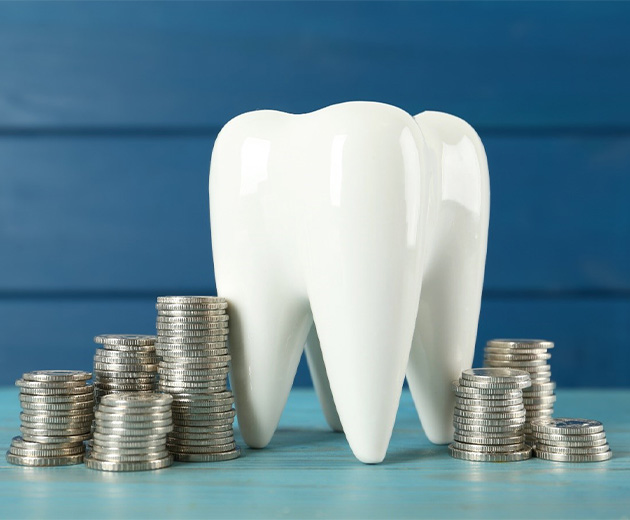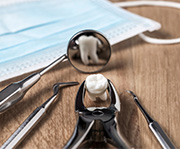Tooth Extractions – Alexandria, VA
Removing Teeth to Save
the Whole Smile
Not counting wisdom teeth, you only have 28 permanent teeth that are meant to last the rest of your life. It’s generally better to take whatever steps are necessary to save decayed or injured teeth instead of having them removed. That said, some teeth are beyond salvaging, and an extraction might be the only way to resolve your current oral health issues. If you need tooth extractions in Alexandria, VA, you can trust the capable hands of the experts at Northern Virginia Oral, Maxillofacial & Implant Surgery.
Why Choose Northern Virginia Oral, Maxillofacial & Implant Surgery for Tooth Extractions?
- Multiple Forms of Dental Sedation Available
- Reliable Implants for Replacing Teeth
- State of the Art Techniques and Technology
What Are Tooth Extractions?

An extraction is the surgical removal of a tooth. As a rule of thumb, it’s typically best to try and keep as much of your natural oral structures intact as possible, but there are many situations in which a problematic tooth can cause more trouble than it’s worth. In those cases, your oral surgeon can perform an extraction to remove the offending tooth and preserve the integrity of your smile.
Most people need at least one surgical extraction over the course of their life, and the team of professionals at Northern Virginia Oral, Maxillofacial & Implant Surgery take great care to ensure that your extraction is safe, comfortable, and a positive experience.
Reasons for Tooth Extractions

Some of the more common reasons your oral surgeon might suggest an extraction include:
- Full-mouth Rehabilitation - If you’re going through a full-mouth rehabilitation, your oral surgeon might recommend extractions to remove teeth with damage or infection, often from periodontal disease, that restorations or endodontic therapy cannot treat.
- Dental Implant or Denture Preparation - If you’re replacing teeth with standard dental implants, All-on-4® implants, or a partial or full-mouth denture, your oral surgeon might need to remove damaged or infected teeth to make room for your new restorations.
- Wisdom Teeth Problems - Most people don’t have enough room in their smiles for extra molars, making the extraction of wisdom teeth necessary. If left alone, wisdom teeth can lead to several health complications, including infection and crowding issues.
- Impacted Canines - After the wisdom teeth, the upper eyeteeth, or canines, are the second most likely teeth to become impacted. If your permanent canine is having problems erupting through your gums, your oral surgeon might recommend extracting it to preserve the health of the rest of your smile.
Tooth Extractions Aftercare

After tooth extraction, the socket from which it was removed will develop a blood clot. This clot is essential to your healing process, and all efforts should be taken to ensure that it’s allowed to form properly. Your oral surgeon might suggest refraining from creating any suction pressure in your mouth, like you would when drinking through a straw, and being careful to not touch your extraction site with your fingers or a toothbrush.
Your oral surgeon will give you specific and detailed instructions for your extraction aftercare to ensure a speedy recovery and prevent complications, like a dry socket. They’ll also discuss tooth replacement options, like implants, a denture, or a bridge.
Get started with extractions today by scheduling a consultation at Northern Virginia Oral, Maxillofacial & Implant Surgery. You can book your visit by phone or online.
Understanding the Cost of Tooth Extractions

If you need a tooth extraction, you may worry the process is costly. After all, it isn’t every day that you get a pearly white pulled. You might view a rare treatment like extraction as pricier than standard ones. Truthfully, though, care might not charge what you think. The cost of tooth extractions varies by patient; you’ll need to see our surgeons for an estimate. Plus, our office will strive to make your visit affordable. To learn more, keep reading or call us for details.
Factors That Can Affect Tooth Extraction Cost

Before treatment, our office will perform an oral exam on your problem tooth. This step lets us examine factors that impact the final extraction price. These include the following:
- Tooth Type, Location, and Number: As you’d imagine, it’s expensive to extract several teeth instead of one. Plus, some chompers cost more to pull than others.
- The Extraction’s Difficulty: Treatment shouldn't be too pricey if you only need a simple extraction. However, you’ll have to pay more for a surgical one involving gum tissue removal.
- Your Need for Sedation: Technically, a local anesthetic is included in an extraction’s base price. That said, treatment will cost more if you want to add dental sedation as well.
- Tooth Replacement: Naturally, following up extraction with tooth replacement – an implant, for example – will add to your visit’s price.
Does Dental Insurance Cover Tooth Extractions?

Because tooth extractions are major procedures, dental insurance will usually cover them. In particular, most plans meet 50% of their cost after the deductible is met.
All that said, exceptions always exist. Your own plan may cover a limited number of teeth. On the other hand, it could involve a lengthy waiting period before coverage starts. Therefore, confirm your benefits before pursuing treatment. Our office will happily help you do so if necessary.
Other Options for Making Tooth Extractions Affordable

Whether you have insurance or not, other ways exist to make extractions affordable. The best one is to use a financing option provided by your local practice. For example, our own office provides:
- Special Offers – Our practice is currently running two relevant offers. The first is a complimentary dental implant consult. Meanwhile, the second is monthly financing of wisdom tooth extraction.
- Flexible Financing – We happen to work with Care Credit, a reputable third-party financier. Through them, you can pay for treatment with monthly, low-interest installments. This approach lets you gradually meet an extraction’s cost instead of all at once.
Ultimately, tooth extraction can be affordable at Northern Virginia Oral, Maxillofacial & Implant Surgery. That being the case, book a consultation at our office today!
Tooth Extractions FAQs
Does Getting a Tooth Extracted Hurt?
Many people fear that tooth extraction hurts. That worry can prompt them to avoid treatment. Even so, the tooth removal process is painless.
You see, dentists work to make the extraction pain-free. They’ll first numb your mouth before removing any teeth. That way, you won’t feel discomfort from their efforts. The most you’ll sense is some pressure as the dentist wiggles your tooth.
Of course, you may feel sore after the procedure. The anesthesia used to numb your mouth will wear off. However, any such aches are temporary and fade quickly. You can also manage them with store-bought pain relievers. You’ll only need to contact your dental team if the pain worsens or you show signs of an infection.
What’s the Difference Between Tooth Extractions and Wisdom Tooth Surgery?
Yes, tooth extraction and wisdom tooth surgery have a few common points. They both involve the removal of teeth for health purposes. Still, the two are distinct and different procedures.
For starters, they differ in their design. An extraction can remove any tooth that's causing you issues. On the other hand, wisdom tooth surgery only removes your third molars. The former treatment is thus more versatile.
Another key difference is treatment complexity. A tooth extraction is almost always simple and won't involve surgery. In contrast, a wisdom tooth extraction is often surgical and makes an incision in your gums.
Can I Leave the Space Empty After a Tooth Extraction?
If a dentist extracts a back tooth, you may think you don’t need to replace it. However, a replacement is still the best option.
Remember, your teeth do more than create a pretty grin. They’re crucial to chewing and speaking as well. Should even one go missing, you could develop poor nutrition, a lisp, etc. Such things would then lower your overall quality of life.
Given these facts, book a visit with your dentist to discuss tooth replacement. They’ll help you find an option that truly works for you.
What Should I Do After My Tooth Extraction?
After your tooth extraction, your mouth needs time to heal. It won’t recover from treatment at once. So, you should follow crucial aftercare tips at that point.
First and foremost, get enough rest. “Taking it easy” will help your body heal from your procedure. That means no strenuous activities for at least the first twenty-four hours. Otherwise, delays in recovery could lead to further problems.
Other aftercare tips include:
- Keep the gauze pad in place as instructed.
- Avoid using a straw or spitting (for at least three days).
- Don’t touch the wound with your tongue or fingers.
- Take store-bought or prescribed pain medicine as instructed.
- Stick to soft foods at first, especially yogurt and applesauce.
Is There an Alternative to a Tooth Extraction?
Although there are many durable, lifelike tooth replacement options available, your dentist’s number one priority is always saving your natural teeth.
To answer whether there is an alternative to having your tooth extracted depends on the reason why your dentist or oral surgeon is recommending it in the first place. For example, if it is due to extensive decay, a root canal procedure may be an option. If it is because of periodontal disease, root scaling and planing could help preserve it. However, if your dentist is recommending an extraction, these may not be viable solutions.
Should a tooth extraction be necessary to restore your smile and bite, you can rest assured that this is the best way to get back your strong, healthy, pain-free smile.
Can I Smoke After Getting a Tooth Extracted?
Because tobacco products such as cigars, cigarettes, chewing tobacco and even e-cigarettes (vapes) can delay your healing, you cannot smoke immediately following a tooth extraction.
It is recommended that you wait to resume tobacco use for at least five days after your extraction; however, if possible, you should abstain for at least two weeks.
If you’ve struggled to quit in the past, don’t hesitate to speak to your dentist. They aren’t there to pass judgement and may be able to help you prepare in advance.
How Long After a Tooth Extraction Can I Get Dentures?
In most cases, it takes between six and eight weeks to get dentures.
Once you’ve healed from your extraction, your dentist will take impressions of your mouth which will then be used to customize your restoration. During this time, they’ll make note of the ideal size, shape, and shade of your replacement teeth. The lab artisans will then follow these guidelines to meticulously craft your new dentures.
Once they’ve been created, your dentist will then have you come in to try them on. They can make any final adjustments if necessary and teach you how to properly care for your dentures to keep your new and improved smile in pristine condition at home!
What Risks Are Involved with Tooth Extractions?
The great news is that tooth extractions are considered extremely safe. However, as with any dental procedure there are always some risks. With extractions, the primary risk is infection, which can spread throughout the body if not treated promptly.
Dry socket is another risk, which can be both painful and delay your recovery process significantly.
To prevent these from occurring, your surgeon will provide you with an extensive list of aftercare instructions as well as a list of common symptoms of infection to lookout for in the days and weeks following your procedure.
